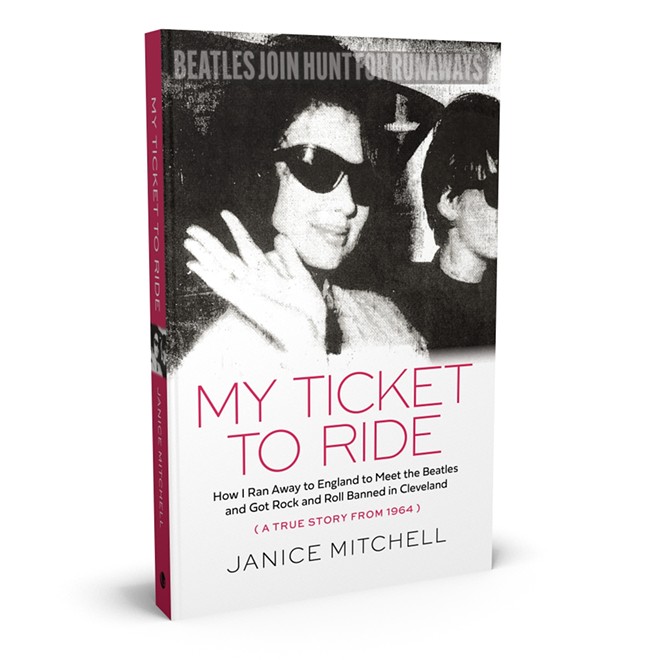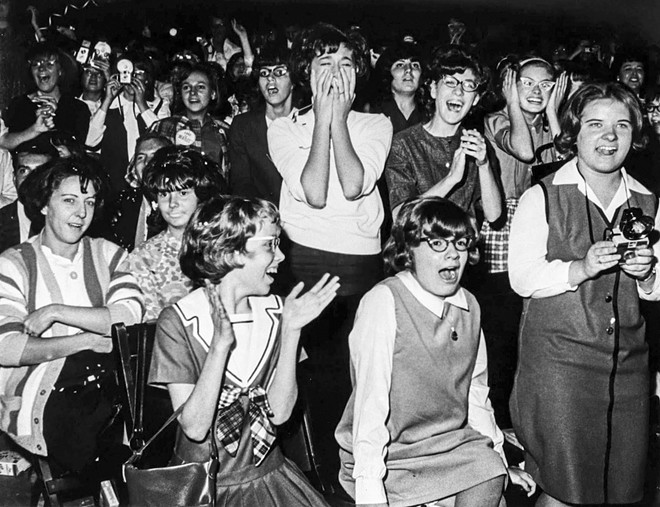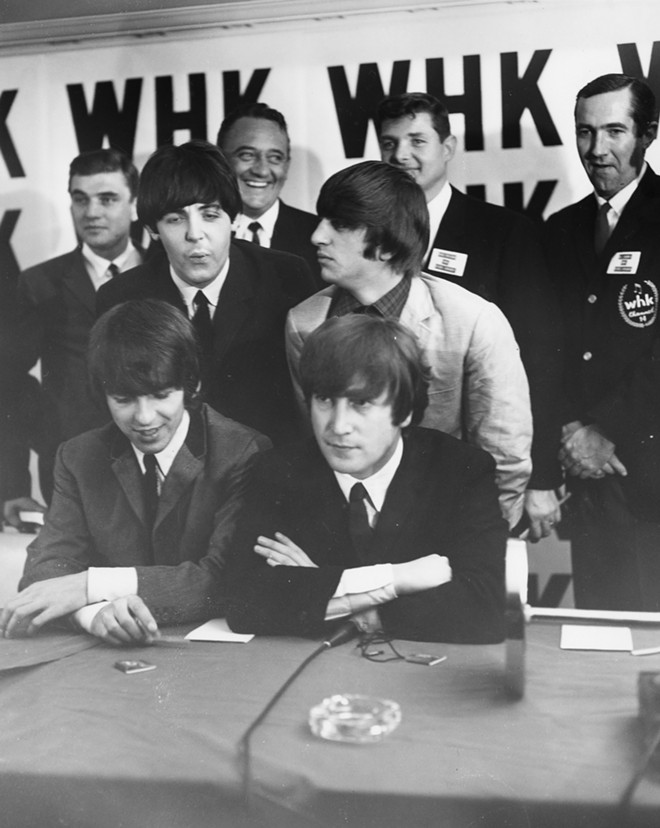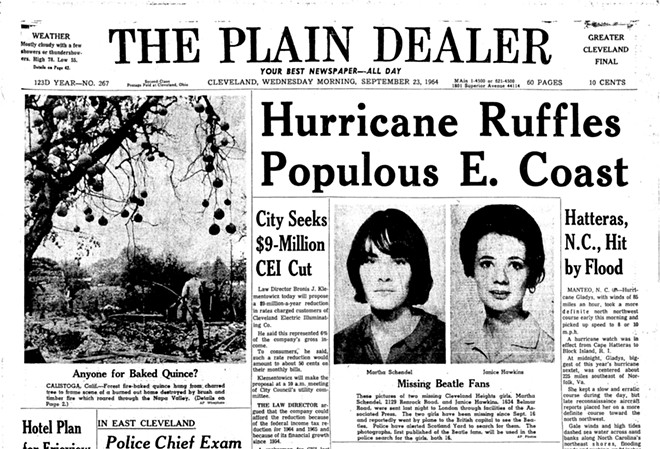In 1964, millions of girls daydreamed about running off to England in search of the Beatles. Two 16-year-old girls from Cleveland Heights actually did it. Janice Hawkins (now Janice Mitchell) was one of them. Her new book, My Ticket To Ride: How I Ran Away to England to Meet the Beatles and Got Rock and Roll Banned in Cleveland gives a firsthand account of her adventure — and of the early days of Beatlemania.
Mitchell was bit by the Beatlemania bug from the moment she first heard “I Want To Hold Your Hand” on Cleveland radio station KYW in December 1963. But listening to the Beatles’ records, reading about them in magazines and even seeing them in concert wasn’t enough. She wanted to live in their world. Janice’s own life, in an unhappy home with a legal guardian who seemed to resent her, was deeply unhappy. To her, the Beatles sounded like freedom.
“Everything about the Beatles transported me into another world,” she writes, “a world that I wanted to be part of.”
She convinced her best friend Martha (Marty) to join her and run away to London and search for the Fab Four on their home turf. And to stay there for good, perhaps even landing jobs with the band’s manager, Brian Epstein.
The idea to run off to “Beatleland” was inspired by teen magazines that reported facts and rumors about the world-famous band, including that they often hung out in London clubs. Though born in naivete, the girls’ plan was surprisingly meticulous. Thanks to Marty’s college fund, they spent three exciting weeks in what was then the center of the pop music universe, visiting clubs every night and falling hard for two local musicians.
Their biggest mistake was assuming no one would look for them.
The search for the girls — led by Cleveland Heights police and joined by the U.S. Department of State and London Metropolitan Police — became a major news story across the U.S. and U.K. with daily hadelines. But Janice and Marty were too caught up in their fantasy to notice.
Eventually, the girls were found and hauled back to Cleveland to face an unsympathetic juvenile justice system. Mitchell recounts the startling differences in how they were treated by the London police (like misguided but harmless minors) and by the Cleveland Heights detectives and county authorities who took them into custody (like dangerous criminals).
The adults around her told Janice it would be best to put her adventure behind her and just move on, to forget it happened. She didn’t speakd of it again. Until, more than 50 years later, she found tucked inside an old photo album an envelope holding a few scraps of this hidden past. As she read through faded news clippings from 1964, Janice realized just how extraordinary her adventure had been. It was worth sharing, she decided—and now there was no one to stop her. She began researching and writing a book.
The following excerpt from My Ticket to Ride by Janice Mitchell begins with the Beatles’ 1964 concert in Cleveland.
***
September 15, 1964
The Beatles concert on September 15 at Cleveland’s Public Hall was the last event—and the main event—before the next stage of our plan. The concert was supposed to start at eight p.m. As kids and adults began filling the hall, we edged through the crowd and made our way down the aisle. Hearts pounding, Marty and I found our seats: front row center—best seats in the house. There was no way to get any closer to the Beatles than we were. We were so excited! It was hard to just sit and wait to see them, knowing they were right behind the curtain.
The place was completely packed. The opening acts were the Bill Black Combo, the Exciters, Clarence “Frogman” Henry, and Jackie DeShannon. All we wanted was the Beatles. Where were the Beatles? The Fab Four, those lovely Liverpudlian British-accented lads. We had waited for this moment for months.
“I love Paul.”
“George!”
“Ringo is so cute.”
“John is so handsome.”
The stage was covered floor to ceiling with a heavy, red velvety curtain with the call letters for the radio station WHK and the word BEATLES spelled out in something glittery against the backdrop of the curtain. The Exciters finished their set, and we held on for the Beatles.
Ringo’s drums sat like a crown on a stand draped with light-blue pleated fabric. In front of Ringo stood Paul on the left of the stage, George in the center, and John on the right.
Oh my God! They were there, onstage, right in front of us.
Girls screamed, cried, and lost their minds.
“George!”
“Ringo!”
“Paul!”
“John!”
The screaming was so loud you could barely hear anything the Beatles sang or played. The first song was “Twist and Shout,” followed by “You Can’t Do That,” then “All My Loving.” I watched and adored. My heart pounded.
In the middle of “All My Loving,” the crowd of fans, mostly girls, unable to contain their excitement, started rushing down the aisles. The Beatles had performed for only about ten minutes. Screaming, yelling, and crying filled the auditorium. I put my hands over my ears. It was the loudest, most continuous screaming I’d ever heard in my life. A mob of Beatle fans stampeded toward the stage with outstretched arms flailing in the air and wildly waving signs. A tsunami of Beatlemania crushed the wall of police officers who tried to hold them back from the brass rail about ten feet from the stage. A few girls got through and clambered onto the stage, still screaming as they headed for the Beatles. This was not the “delicious insanity” that described crazed fans in the Original Beatles Book magazine, which was one of my favorites. This was complete—even dangerous—insanity. I held on to my seat, terrified of what the crowd might do next.
Fortunately, the Cleveland police officers at the front of the stage worked hard to control the crowd. I stayed in my seat, as did the other girls in the front row. I was angry and disgusted at the out-of-control girls who ruined the concert. We went through so much to get these tickets, and they had disrupted everything. Men in suits and police officials walked back and forth talking to one another on the stage. The police tried to stop the show, but the Beatles kept on playing.
One policeman took the microphone from John Lennon.
“The show’s over!” he yelled.
A second policeman grabbed George’s arm and led him off the stage. The Beatles were supposed to play twelve songs, and officials stopped the show in the middle of the third song.
A third police officer took the microphone and said to the crowd, “You can yell all you want, but you’ll have to remain seated.”
Another official-looking man took the stage. He announced that the concert would continue if everyone remained in their seats. When the Beatles left the stage, it seemed to be a wake-up call to all the unruly kids. Girls sitting in the rows behind me sobbed loudly.
Harry Martin from KYW radio and his sidekick Specs Howard rushed onto the stage. Specs tried to reason with the mob and asked if we wanted the concert to be canceled. Of course, everyone yelled “No!” He said he was going to count backwards from three, and by the time he got to one everyone should be in their seats. It worked. At number one, everyone calmed down, and the auditorium was relatively quiet. It was a magical moment.
The concert could go on.
Harry Martin told us to tune into KYW radio on Monday morning, and he and Specs would play three Beatles songs in a row. The crowd roared in delight. Anything about the Beatles was magic. Just say the word “Beatles” and the world was immediately at your feet. Just sing “Yeah, yeah, yeah” and everyone knew you were singing a Beatles song.
The Beatles came back onstage. One of the police officials spoke to George. George spoke to Paul.
“Good,” Paul announced into his microphone so the crowd could hear. “Thank you,” Paul continued. “We’d like to carry on with a song that was on our first Capitol album. We hope you enjoy the song. The song is called . . .” The Beatles went on to continue to play “All My Loving.” Paul acted as though nothing at all had happened. John, Paul, George, and Ringo never missed a beat after that crazy interruption.
The crowd of crying and weak-kneed youngsters settled down. The Fab Four performed “She Loves You,” “Twist and Shout,” “You Can’t Do That,” “Things We Said Today,” “Roll Over Beethoven,” “Can’t Buy Me Love,” “If I Fell,” “I Want to Hold Your Hand,” “Boys,” and “A Hard Day’s Night.” Even though I barely heard them above the crowd, I saw their lips moving. I knew the words to every song and sang along with them. They were real, and they were all right in front of me.
Finally, Paul announced, “Now for our last song of the night . . .” and the Fab Four did one of the wilder songs, “Long Tall Sally.” Paul sang lead. He stepped right up to the microphone and screamed the words while playing his bass, smiling, and shaking his head back and forth. “Ooh ooh ooh, baby!” he sang.
George and John played guitar. Ringo smashed out an unstoppable beat on his drums while lowering his head and shaking his hair. During that last song, a few girls tried to storm the stage to get at the Beatles, but the police caught them before they could do any damage.
When the concert ended, we shuffled along with the crowd toward the exits, picking our way through broken chairs and ripped signs with messages to Paul, George, Ringo, and John. Aside from some girls who fainted and had to be carried out of the auditorium, there didn’t seem to be any other injuries. At last I’d gotten to see Paul, John, George, and Ringo in person. They were everything I hoped for. I stepped out of Public Auditorium into the fresh air.
The next day was to be the biggest day of my life. On Wednesday, September 16, 1964, at eight a.m., I would call a taxi and take my suitcases, passport, and one-way Trans World Airlines ticket and escape to London, England.
***
Instead of going to school, I walked to Marty’s house, where all my things were packed and ready to go. One major potentially horrifying thing could happen. The whole plan could be ruined shortly. I wouldn’t know until I got closer to Marty’s house. What if either her mother or sister didn’t go to work for some reason this morning? What if one of them was sick? We would be completely ruined. They always left for work together at 7:15. We were cutting it close. I walked as fast as I could to Renrock Road and looked for a car in the driveway. No car. We were free! Inside, we got the phone book, found the number for Yellow Cab Company, and called. We dragged our suitcases to the front door and waited. It seemed to take forever, but about fifteen minutes later the cab pulled into the driveway. The driver put everything we had in the trunk as we slid into the back seat. Maybe we didn’t need to bring practically everything we owned. But we were leaving Cleveland forever.
“You girls are going to the airport, right?” he said.
I was a little nervous. It had taken too long to get all our things in the cab. We need to hurry. If any of the neighbors saw us getting into a taxicab instead of going to school, they might wonder. Teens did not travel to school with suitcases and Yellow Cabs.
“What airline are you going to?” the cabbie asked.
“Trans World Airlines,” Marty said.
He didn’t say a thing about school. We didn’t say a thing about going to London to be with the Beatles.
***
At Hopkins Airport, we checked in at the TWA desk and gave our suitcases to a lady in a TWA uniform.
“Do you think anyone at school noticed we’re not in class?” I asked Marty. I had only attended Cleveland Heights High School for a few days since transferring from Ursuline, but Marty had been there longer and would know better than me how things were handled.
“No, they won’t notice for a few days.”
I was shocked. At Ursuline Academy, there were about twenty-five girls in my sophomore class. If I didn’t show up for first-period homeroom, Mother Superior would have called my aunt, Toots.
Once our bags were checked, there was nothing to do but wait for our flight. This was the first time I had ever been on a plane, and I didn’t know what to expect. The plane was scheduled to depart at 11:05 a.m. and arrive at John F. Kennedy International Airport at 12:20 p.m. Our flight from Kennedy, TWA flight 700, was departing at 8:00 p.m. We’d arrive in London at Heathrow Airport the next morning, at 7:40 a.m. London time.
I knew Toots wouldn’t believe me—or care if I left—but I still felt it only right to tell her anyway. I had picked a night about a week before Marty and I left. Toots and I were in the kitchen, standing at the sink washing the dinner dishes—a nightly ritual. I loved standing next to her doing the dishes. Toots was short, round, soft, and plump. I loved that about her.
She usually wore a white apron with a bib that had red piping around the edges and red cherries printed all over it. I loved her so much and just wanted to hug her, but she wasn’t the hugging type. I wasn’t positive, but it might have been a small sin, a venial sin. It was impossible to find out, since questions were forbidden, too.
But how should I tell her about England? I couldn’t just blurt out, “By the way I’m going to England and I’m never coming back.” Just more foolish talk about those “silly Beatles” as she called them. She had heard me listening to Beatles music and talking nonstop about them with Marty for months and tuned me out on that subject.
Toots washed the dinner dishes in hot, soapy water in a dishpan in the sink. Plates, cups, and silverware were pulled one by one from under a thick blanket of white bubbles to be scrubbed and rinsed under hot water from the faucet. She handed me a dish to dry and place in the dish rack on the counter to my right.
“I’m going to England,” I said.
She finished washing the last dish and handed it to me. “How are you going to get there—swim?” She dried her hands, removed her apron, and walked away.
Mixed in with the truth of my announcement that I was leaving for England, I did my fair share of storytelling, too. When I knew that my passport was arriving, in case Toots wondered why I received an envelope from the State Department, I mentioned I was expecting something in the mail for a school project. She was used to me receiving mail and never questioned it. I always sent away for things from cereal boxes and comic book ads when I was younger, and as I got older, I ordered items from teen magazines, like Beatles pictures.
I was watching for other mail, too. I hadn’t yet received an answer from the Beatles’ manager, Brian Epstein, to my letter asking him for a job. I hoped to get his letter by September 15, the day of the Beatles concert; otherwise it would be too late.
What if Mr. Epstein wanted to interview me? How would I know in time?
***
When we landed at Kennedy, Marty and I walked around the TWA terminal. It was so futuristic, it reminded me of The Jetsons. We decided to buy a carton of Newport menthol cigarettes. You couldn’t describe what we did as smoking. It was more like trying to inhale without coughing, choking and gasping for air. Holding a lit cigarette about shoulder high would tell anyone that we were definitely mature and very cool.
I looked out of the TWA terminal windows toward the planes on the tarmac. I was already in love with flying. The sky was dark, and it looked cold outside. We walked along a covered jetway to get to the plane.
I didn’t dare look behind me. I tried to act casual in every way as I hurried along with everyone else walking to Flight 700. I tried to erase the image in my brain of someone calling out my name, my turning around, and then our being dragged back to Cleveland.
No, that can’t happen. Not now. We’ve come too far. We’re so close!
We boarded the plane and took our seats. I had the window. We fastened our seat belts, London bound. The plane taxied down the runway. Soon we would be breathing the air that the Beatles breathed, and I would be free.
Next stop: Beatleland.
Excerpt adapted from the book My Ticket to Ride, © Janice Mitchell. Reprinted with permission of Gray & Company, Publishers. Available in Northeast Ohio bookstores and online from ClevelandBooks.com and Amazon.
Catch Mitchell at two upcoming events where she'll talk about the book.
Thursday, Sept. 23 at 7:00 p.m.
Music Box Supper Club
1148 Main Ave, Cleveland
Cleveland Stories Dinner Party
Free admission; dinner and drinks available for purchase
Friday, Oct. 1 at 6:00 p.m.
Loganberry Books
13015 Larchmere Blvd, Cleveland
Book signing
Free and open to the public. Part of Larchmere First Friday.





